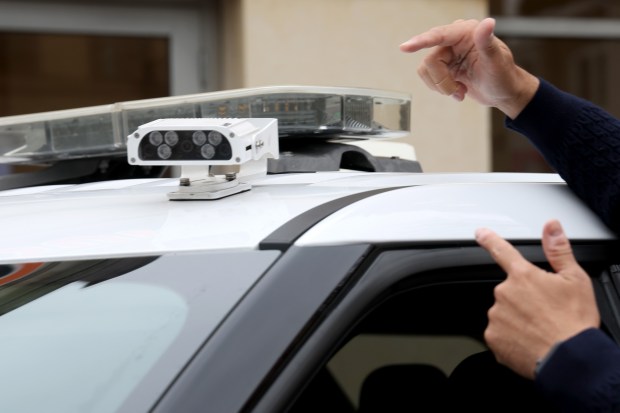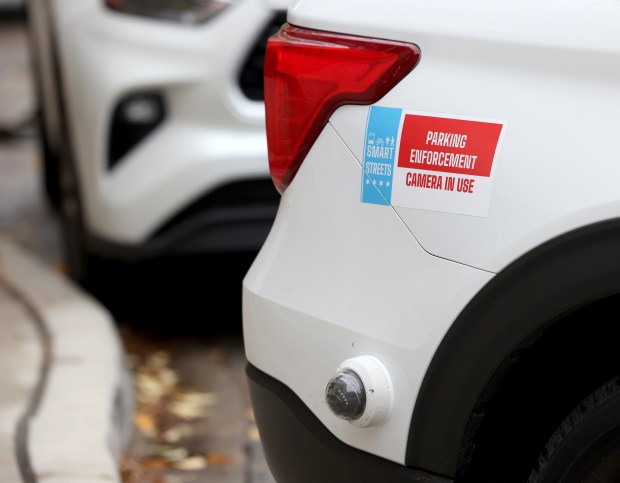Owners of vehicles parked in bike and bus lanes downtown can now receive warnings and, soon, tickets in the mail, as a delayed program to test automated ticketing for the parking infractions has begun.
The pilot program, which uses cameras on eight city vehicles to enforce parking violations, began Monday. For the first month vehicle owners will receive only warnings, but as of Dec. 5 they could receive tickets with fines in the mail. When tickets start being issued, drivers will receive a warning for the first violation, and will be fined for subsequent infractions.
The program, called Smart Streets, is also set to rely on cameras installed on CTA buses, but the bus cameras are not yet in use, Chicago Department of Transportation officials said. The CTA is still working to procure the cameras, and could have them on buses in the spring, the officials said. The transit agency hasn’t yet identified specific routes that will include the cameras, but they could be used on up to six buses that run in areas such as Madison and Washington streets downtown or along Dearborn Street.
The program was also initially set to use cameras mounted on poles to issue tickets. The city has backed off the use of fixed cameras, though, citing concerns about cost and saying the mobile cameras will allow the city to “prioritize hotspots” and “address issues as they come up rather than being tied to specific locations.”
The test run of the program allows the city to use the cameras to mail violations to registered vehicle owners for violations such as parking in bike lanes, bus lanes, crosswalks, bus stops and no-parking zones, and includes an effort to prevent double parking in commercial loading zones. It will run for two years from the date the first ticket and fine is issued, and covers much of the downtown area from the lake to Ashland Avenue on the west, North Avenue to the north and Roosevelt Road to the south.
The program will also soon include issuing tickets for parking meter violations, the mayor’s office said.
The program was first approved in March 2023, and in February transportation Commissioner Tom Carney said the program could be up and running by summer. Monday, Carney said the delay in starting the program was because of the procurement process for the cameras.
Advocates have billed the program as a way to improve safety for cyclists and pedestrians and speed up bus service by trying to remove blockages from dedicated lanes.
“We’re simply modernizing how we enforce these laws, making sure our streets work better for all users. Our goal is not to issue fines, but to create safer streets,” Carney said, standing near Milwaukee and Chicago avenues, where bus lanes, bike lanes and truck and car traffic criss-cross the busy intersection. At one point, a vehicle stopped in the bus lane behind the podium from where Carney was speaking.
The effects of vehicles parked in bike lanes have drawn heightened attention in recent years, particularly after 3-year-old Elizabeth Grace “Lily” Shambrook was killed in a bike crash in Uptown in 2022. The bicycle she was being carried on was forced to maneuver around a ComEd truck parked in the bike lane, and a semitruck collided with the bike, according to media reports.
But the city’s use of automated ticketing for other types of enforcement, such as speed and red-light cameras, has long been controversial, with city officials pitching the programs as safety measures but critics painting them as a cash grab or arguing they do little to boost safety. Several earlier investigations found the city’s ticketing practices hit low-income violators hardest and were disproportionately owed by drivers of color.
Fines under the new program vary by type of violation but, for example, the fine for stopping or parking in a bus lane is $90, and in a bike lane is $250. An expired meter in the central business district costs a vehicle owner $70, and parking in a commercial loading zone is $140.
The program has not changed the cost of fines previously on the books. Low-income drivers will remain eligible for reduced-price tickets and other debt relief.
Carney could not on Monday provide projections for how much revenue the department expects to bring in from the program, saying transportation officials were not looking to generate additional revenue. City officials, in 2024 budget projections, expected the program to bring in $5 million that year, when the program was expected to be up and running earlier.
“The goal isn’t revenue” 40th Ward Ald. Andre Vasquez said, standing alongside Carney. “The goal is to not have any revenue collected because no one’s blocking the bike lane.”

City Comptroller Chasse Rehwinkel said enforcing parking volations until now has been difficult, because often vehicles block bike and bus lanes only temporarily and getting photos to back up the case in an administrative hearing has been challenging. The automated cameras are intended to improve enforcement, he said.
“As we build a safer and more efficient system, we must work to expand accessibility for our walkers, bikers, transit riders and drivers alike,” Mayor Brandon Johnson said in a statement. “Through automated technology to enforce parking violations in bus and bike lanes, this pilot program helps us improve transit reliability and protect our vulnerable road users. As we evaluate its impact over the next 30 days, I want to ensure our residents know we are not passing out fines. We are evaluating the impact of this technology to learn the best practices and will continue to work to refine our approach to make our streets even safer and more accessible.”
Before the two-year pilot ends, the city’s Transportation and Finance departments must report on the program’s effectiveness to City Council.



